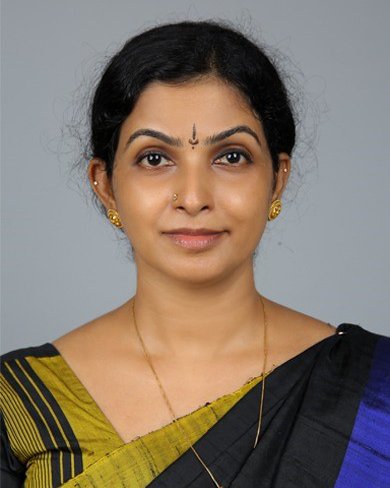Dr. Kavitha Balakrishnan, Former Dean at Department of Law, Kannur University on her Artistic Pursuits and Approach to Legal Education

Interview conducted by Shalima as a part of her Campus Leaders Program.
Dr. Kavitha balakrishnan is a highly respected academician and legal scholar who has significantly shaped the landscape of legal education in Kerala. She has served in key positions such as Dean of Faculties at Kannur University, Head of the Department of Law, and Chairperson of the Board of Studies in Law.
Her academic and institutional contributions extend to curriculum development, legal aid coordination, and membership in various regulatory and ethics committees, including the Bar Council of India’s Inspection Committee.
What makes her journey especially compelling is the way she brings together two seemingly different worlds—law and classical art.
Alongside her academic work, Dr. Kavitha is an accomplished classical dancer, veena player, and painter, with exhibitions that have supported meaningful causes like palliative care.
Her ability to pursue both intellectual discipline and creative passion with equal sincerity offers an inspiring perspective on leadership, balance, and personal integrity within the legal profession.
Reflecting on your tenure as Dean of Faculties at Kannur University (2014-2017) and Head of the Department of Law for eight years, what were the most significant challenges you faced in academic administration, and what key lessons did you learn that you believe are crucial for aspiring legal professionals entering administrative roles?
Administration was quite a difficult responsibility for me at a young age, especially in the beginning when I had no one to guide me or answer my questions about administrative procedures. Despite having only a few permanent staff, I was responsible for handling pending evaluation processes and other core tasks.
Over time, I took on additional roles—affiliating with the Bar Association, drafting the LLM and LLB syllabus, and in 2015, I was appointed as Dean. I have since organized international seminars, collegiums, and workshops. While administrative duties can sometimes affect academic engagement, I’ve found that strong time management skills have helped me balance both effectively
You are a classical dancer, Carnatic music exponent, and an accomplished painter who has even held solo exhibitions for charity. How do these diverse artistic pursuits influence your approach to law, legal education, or even your administrative roles? Do you find any parallels between the creative process and legal problem-solving?
The idea that ‘lawyers are social engineers’ reflects my belief that the legal profession must be grounded in humanity. My background in classical dance, music, and painting has shaped the way I connect with people. These art forms have taught me empathy, patience, and deep listening.
As a legal aid coordinator, I’ve interacted with many individuals facing serious problems. I always remind myself that their issue may be the most important challenge in their life. I try to make them feel safe—like they are speaking to a sister or a mother—so they can open up fully. My artistic side helps me build that trust.
Even during stressful times in legal or administrative roles, I turn to music as a way to calm my mind and keep a balanced approach. I believe creativity and compassion are just as important in law as they are in the arts
What inspired you to pursue a career in law?
Initially, I did not choose law with a clear intention. Coming from a science background, my entry into the legal field was influenced by my father’s interest and encouragement. When I joined the 3-year LL.B. program, I found the subject quite challenging—especially the case studies.
I struggled in the beginning and had to rely on rigorous writing and memorization to cope, eventually achieved excellent marks. That success gave me the motivation and confidence to continue.
I believe that even if a course or subject doesn’t feel like the right fit at first, hard work and commitment can lead to success and even passion. Over time, law became my favorite subject.
Looking back, I realise that choosing law was one of the best decisions I made. It gave me opportunities to help others, especially through legal aid work where I support innocent individuals and serve the community. The ability to make a real difference in people’s lives has made me deeply grateful for this path.
Many law students aspire to a career in academia or judiciary. What core values or habits would you recommend they develop during their college years?
If you’re aiming for a career in academia or the judiciary, it’s important to approach your legal education with clarity and commitment—not just as a way to clear semesters, but as a lifelong foundation. These paths require more than just knowledge; they demand discipline, consistency, and a deep sense of responsibility.
One key habit is balancing both smart and hard work. Memorising key sections, understanding case laws thoroughly, and regularly referring to legal codes are essential. At the same time, it’s not just about rote learning—developing analytical thinking and a habit of asking “why” behind every legal principle will help you grow intellectually.
I also believe participation outside the classroom plays a vital role. Attending seminars, presenting papers, writing articles, and contributing to journals are not just academic exercises—they sharpen your communication skills, expand your perspectives, and build a strong academic profile. These activities also reflect your seriousness and dedication on your CV.
Being a prolific academic and a peer reviewer for global publications, what advice would you give to young law students interested in starting legal research and publishing papers?
I became a peer reviewer and editorial board member for U.S.-based journals through academic exposure and networking. Attending international seminars, especially abroad, gave me the opportunity to connect with academicians from around the world. These connections often lead to valuable guidance, collaborative research, and even joint publications.
For young law students, my advice is to start by participating in seminars and conferences. These platforms help you understand academic expectations and build a research mindset. When writing for international journals, be prepared for a long and detailed peer-review process. Sometimes, it can take up to a year for an article to be accepted, as reviewers often suggest major revisions. They expect the writing to be of high quality, similar to that of a Ph.D. thesis.
Peer reviewers—both from Eastern and Western academic traditions—follow very strict guidelines. So, your research must be original, well-structured, and written in clear, professional English. Focus on developing strong writing skills, understanding research methodology, and staying open to feedback. These steps will help you succeed in legal research and publishing
As a question setter for various public service commissions and other universities, what, in your opinion, are the most important qualities and knowledge areas that competitive examinations should assess in law graduates? How can students best prepare for such examinations?
For law graduates, competitive examinations usually fall into two categories: general exams and those specifically designed for law professionals.
In exams meant for lawyers, the focus is mainly on core law subjects and legal literature papers. Since the core subjects are common across most exams, it is important to develop in-depth knowledge in these areas. Scoring well in core subjects can significantly boost your overall performance.
To prepare effectively, students should thoroughly revise important legal principles, landmark judgments, and recent legal developments. Regular practice through mock tests, solving previous question papers, and focusing on conceptual clarity will also help improve performance.
Disclaimer: Interviews published on Lawctopus are not edited thoroughly so as to retain the voice of the interviewee.
This interview is a part of our Star Interview series, conducted by the Campus Leaders at Lawctopus. Stay tuned for more!

